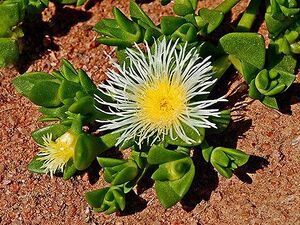Kanna: Difference between revisions
mNo edit summary |
mNo edit summary |
||
| Line 1: | Line 1: | ||
[[File:Sceletium-tortuosum.jpg|alt=Sceletium tortuosum|thumb|'''Figure 1'''. Sceletium tortuosum]] | [[File:Sceletium-tortuosum.jpg|alt=Sceletium tortuosum|thumb|'''Figure 1'''. Sceletium tortuosum]] | ||
'''Kanna is fermented Mesembryanthemum tortuosum, a succulent plant native to the Cape Provinces of South Africa.''' The plant has been used by South African pastoralists and hunter-gatherers as a mood-altering substance from prehistoric times<ref>"[https://pdfs.semanticscholar.org/e059/7331d4a71a5ab0b1ed1e5b2335776424bb89.pdf Sceletium–A Review Update]". Journal of Ethnopharmacology. Gericke, N.; Viljoen, A. M. (2008). 119 (3): 653–663. doi:10.1016/j.jep.2008.07.043. <nowiki>PMID 18761074</nowiki>.</ref>. The | '''Kanna is fermented Mesembryanthemum tortuosum, a succulent plant native to the Cape Provinces of South Africa.''' The plant has been used by South African pastoralists and hunter-gatherers as a mood-altering substance from prehistoric times<ref>"[https://pdfs.semanticscholar.org/e059/7331d4a71a5ab0b1ed1e5b2335776424bb89.pdf Sceletium–A Review Update]". Journal of Ethnopharmacology. Gericke, N.; Viljoen, A. M. (2008). 119 (3): 653–663. doi:10.1016/j.jep.2008.07.043. <nowiki>PMID 18761074</nowiki>.</ref>. The plant has gained widespread global attention and a strong reputation for its ability to promote well-being by relieving stress and offering calming effects. | ||
==== Constituents ==== | ==== Constituents ==== | ||
Latest revision as of 08:55, 3 October 2024
Kanna is fermented Mesembryanthemum tortuosum, a succulent plant native to the Cape Provinces of South Africa. The plant has been used by South African pastoralists and hunter-gatherers as a mood-altering substance from prehistoric times[1]. The plant has gained widespread global attention and a strong reputation for its ability to promote well-being by relieving stress and offering calming effects.
Constituents
Mesembrine alkaloids are considered to be the primary active constituents of kanna. The two major active alkaloids mesembrine and mesembrenone are still in the process of being more fully characterized pharmacologically. They are serotonin reuptake inhibitors, which provides a rationale for the plant's traditional use as an antidepressant, but other actions are beginning to appear in the literature[2].
References
- ↑ "Sceletium–A Review Update". Journal of Ethnopharmacology. Gericke, N.; Viljoen, A. M. (2008). 119 (3): 653–663. doi:10.1016/j.jep.2008.07.043. PMID 18761074.
- ↑ Mesembrine alkaloids: Review of their occurrence, chemistry, and pharmacology. John L. Krstenansky, Journal of Ethnopharmacology, Volume 195, 2017, Pages 10-19, ISSN 0378-8741, https://doi.org/10.1016/j.jep.2016.12.004.
